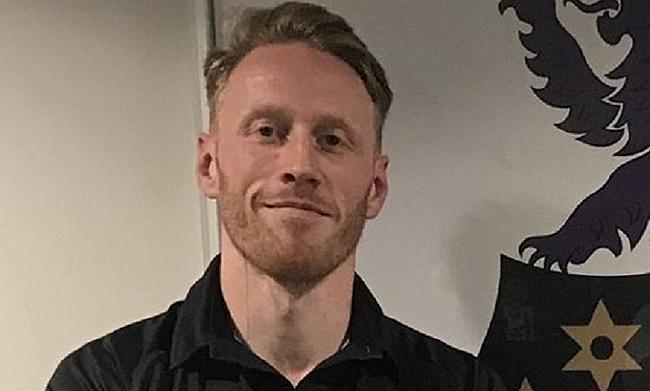Coach’s Corner: Gareth Collins
Following on from our series of articles produced by Cambridge Director of Rugby Richie Williams, Leicester Lions’ Gareth Collins is next to pen his journey in the game as he looks ahead to another National Two South campaign with the Midlands club.
After his introductory post last week, Gareth moves on to talk about his playing days with Leicester Lions and how the club came close to promotion from National Two North…
Following the disappointment of being released by Leicester Tigers at 19, I re-joined my local club, Rugby Lions, whilst I studied at Loughborough University. Both these hugely historic rugby establishments enabled me to fall back in love with the game.
I reinvented myself during my three years at Rugby Lions, becoming a winger/full back. As a young man, playing for his home town club, it was an amazing experience to be playing in Divison 1 and 2 [now the Championship and Nat 1].
Unfortunately, the club had its own off-field problems as it tried to cope with professionalism, and suffered a collapse like so many other great clubs at that time – Manchester, Waterloo, Orrell – to name just a few.
On this day in 2️⃣0️⃣1️⃣0️⃣ The Lions had their biggest ever National League win, scoring 100 points against Kendal. The Lions scored 15 tries including hat-tricks for Lee Dyment and current head coach @glcollins1. 🦁🦁🦁🦁 pic.twitter.com/VXPt9LhRPF
— Leicester Lions RFC (@leicesterlions1) April 26, 2020
Once I finished university, I was invited to sign for a club who were heading in the other direction by a good friend of mine, Allan Mitchell, who was moving their as a player-coach. In 1999, two local sides, Westleigh and Wigston RFC, had amalgamated to become Leicester Lions and they had risen through the Midlands leagues and had gained promotion to the National League for the forthcoming season.
I vividly remember my first meeting with director of rugby Glynn Evans and the excitement at what they were trying to build at the club. Leicester Lions would become my home for the next 10 years and I would make lifelong friends and memories. That is what rugby at any level is all about.
I have so many amazing memories of my playing career – too many to recall them all, and certainly not enough space to do them any justice, but there are a couple that have stayed with me and have helped shape me as a coach.
In 2010, having spent five years establishing ourselves in the division and achieving mid-table finishes, there was a real sense that we had a playing group who could achieve something. It also happened to be the season when Fylde signed Jason Robinson, to go along with some top players that they already had – including fellow England Counties players Paul Arnold, Nick Royle and Oliver Brennand.
We went to Fylde, a ground we hadn’t won at before, in October, with both sides having won their opening five matches. There was a huge crowd (there in anticipation of seeing ‘Robbo’ I’m sure) and the conditions were beautiful. The game is memorable (and not so memorable) for a number of reasons.
#Fylde last played @leicesterlions1 in 2010-11. Fylde lost only home game of promotion season v Lions in Oct (30-32) but won (8-32) at Blaby. Below, Ashton, Nelson, Greenwood & Robinson contemplate the last minute Woodlands defeat. This Sat the game is at TMDP Park (2pm). pic.twitter.com/6sZxYoVwyG
— Fylde Rugby (@fylderugby) September 18, 2018
My first memory is scoring a try midway through the first half to take us in to a 17-3 lead. The next thing I remember is sitting on the bench and looking next to me to see two senior players, Junior Fagalilo and Richard Moore, sat next to me. Evidently, I had knocked myself out when attempting to tackle Nick Royle and Fylde had turned the game around and were now 30-20 up with only a couple of minutes to play.
However, what happened next I remember clear as day. Firstly our mercurial outside-half, Gerhard Boshoff, scored what seemed to be a consolation try. From the resulting kick off, in what was now the last play of the game, Ben Walker, who had come on as a scrum-half replacement, made a break from deep and kicked ahead. With Fylde players scrambling back, four players all dived at the ball. After some nervous deliberation with his assistants, the referee awarded the try and Jon Boden kicked the conversion for the win.
That day typified that side. A never say die attitude. A squad effort. We liked being the underdogs and rose to the occasion. We weren’t the best side by any means, but we won so many tight games at the death. Led by (my now assistant/forwards coach) Jason Aldwinckle, we had an identity and we all bought into it. Not only the way we played but the way we lived – all of our social lives intertwined. This is something that underpins my philosophy of a coach now and the Lions team of last season showed this character, again winning so many games from ‘losing’ positions.
Although we only lost six games that whole season, Fylde only lost four and were rightly crowned champions. They showed their class when they came to our place and won 32-8 in a very accomplished performance later in the season, to all but clinch the title.
That left two sides battling it out for the play-off place, ourselves and our biggest rivals, Loughborough Students. We had shared the spoils between us, each winning their home fixture by the narrowest of margins. So it came to the last game of the season. Fylde had done us no favours in losing to the Students a few weeks previously so we went into the last game of the season three points behind the University side.
We had to go away to Huddersfield, which was always a big challenge, and the Students were at home to fourth place Westoe, who had a great side that year. We did our part and secured a bonus point win, and I can remember being on the pitch nervously waiting for the result to come through. Fingers crossed.
Unfortunately it wasn’t to be and Loughborough beat Westoe and progressed to the play-off, where they were soundly beaten by a Jersey side who were ‘on the up’. I suspect we would have suffered the same fate had we made it, but as that day at Fylde proved, you never know.
The experiences of that season taught me so much, and has continued to inform my decision making as a coach. Part of my decision to return to Leicester Lions was to try and ‘give back’. The club gave me such support in so many ways and I want the current players to have that similar experience. The disappointment of never quite achieving that next step also lives with me and I am desperate to do everything I can to make this Leicester Lions team even more successful than the one I was lucky enough to play in.
That’s my boys! FMJ all day! #feedem https://t.co/Ebla9gDtBp
— Jason Aldwrinckle (@aldwrinckle) September 28, 2019
Having Jason Aldwinckle there with me helps have the link to those times. Rugby has moved on, for the better in many ways, and the standards at every level are always improving, but what remains constant are the core values of our game and we as coaches should never lose sight of that.
At the end of the day, when their playing career is over, what players are left with are memories. What I want to ensure is that my players have as many good ones as possible.

